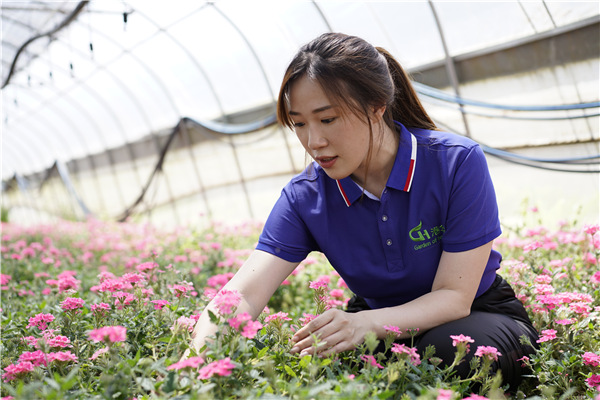A blossoming idea


She is satisfied with her current life, Zhou says. "I get a stable income and don't need to migrate to other places for work. It is exactly the life I always wanted to live."
Zhou respects Leung very much. "Leung is from Hong Kong, a big city, but came to our poverty-stricken village and endured all the difficulties," Zhou says.
"She treats us like friends and always chats with us. I feel confident and hopeful working with her, and she motivates us."
Zhou is among the 30-odd local people whose life has been changed for the better with Leung's help, as her employees. And in planting seasons, Leung says, another 100 people are hired to work temporarily at Leung's flower base in Tiejiang town.
Moreover, Leung rents local people's land for the base. Some poverty-alleviation funds from Guangzhou were also used in building the infrastructure for it. At the end of 2019, Leung shared a profit of over 900,000 yuan, benefiting more than 3,000 poor local people.
According to Wen, over the past five years, 184,000 people have been lifted out of poverty in Hezhang, and Leung has played a role in that.
Growing with the country
Born into a merchants' family in 1991 and growing up in Hong Kong, Leung was told from childhood that she would engage in business like her parents. She went to the United States at 15 and pursued her bachelor's degree in business administration at Boston University.
In 2013, the Boston Marathon bombing happened when she was at school, which made her feel insecure, so she chose not to stay in the US after graduation.
Her family also has business in the Chinese mainland. "I have been going to Guangdong for my vacations since I was young, and got more chances than my peers to see the Chinese mainland and its speedy development," explains Leung. "I realized the true side of it is quite different from what it is described by some Western media."
She feels "heartbroken" to see the chaos and violence in Hong Kong that happened last year. "Many Hong Kong young people say they cannot see their future, but I believe the future must be created with effort, instead of by smashing communal facilities."
Her understanding of poverty alleviation in China has also changed. "I used to understand poverty alleviation in a shallow way, like solely donating money and goods to poor people, but now I realize it covers much more than that."
"Our country has made the cause a national effort, using all the possible resources to help poor people solve problems in various aspects, like housing, education, medical services and finding jobs. It would be really hard to believe China could do so much, and to such an extent, if I hadn't personally participated in it."
Leung was excited to see a formation representing China's poverty alleviation efforts during the military parade to celebrate China's 70th anniversary in Beijing last year. "In the past, I was only related to the formation representing people from Hong Kong, Macao and Taiwan, but this time I felt connected with one more formation," says Leung.
"It made me feel like I was increasingly engaged with the development of our country, and I'm very proud to develop with it."



































